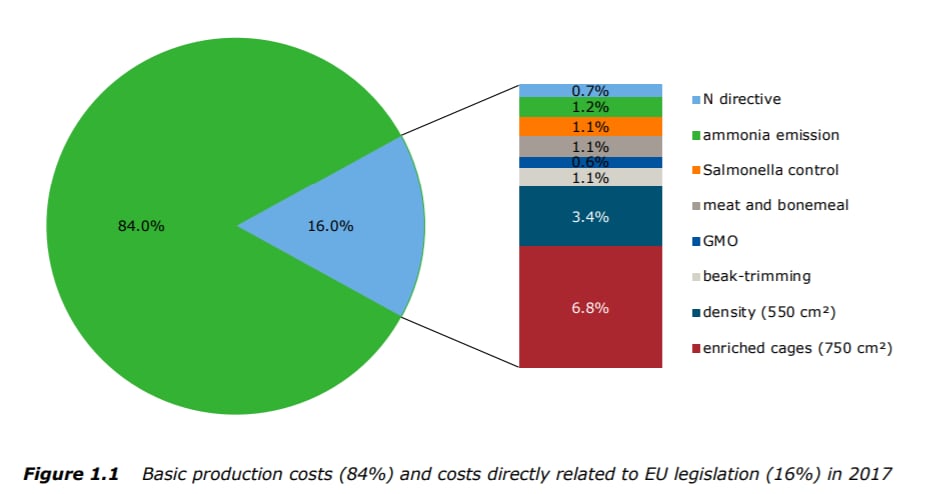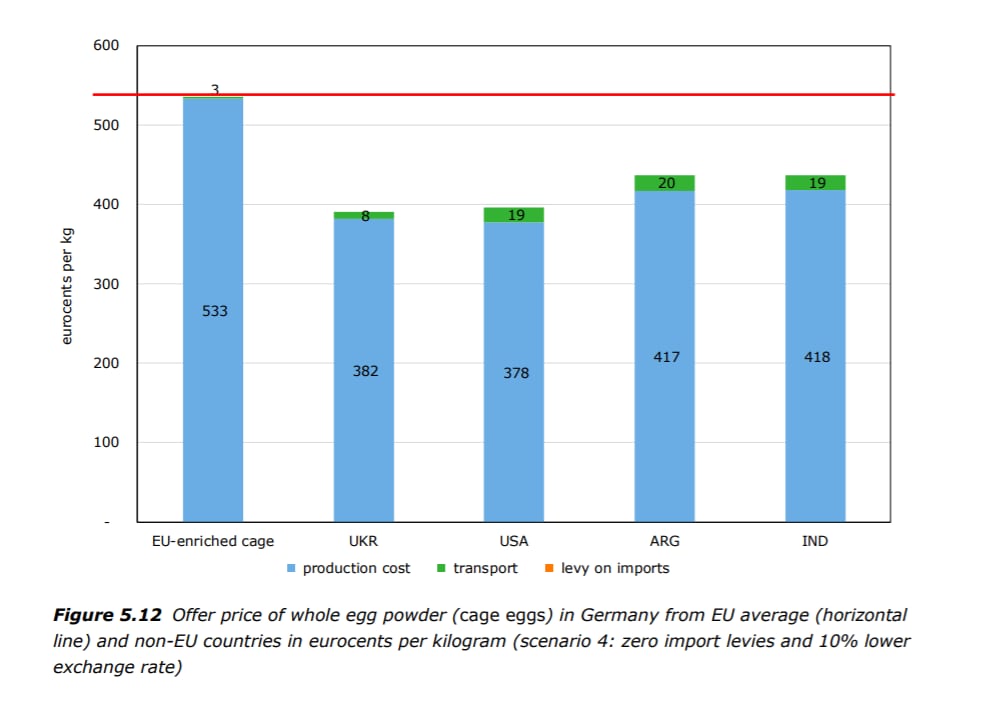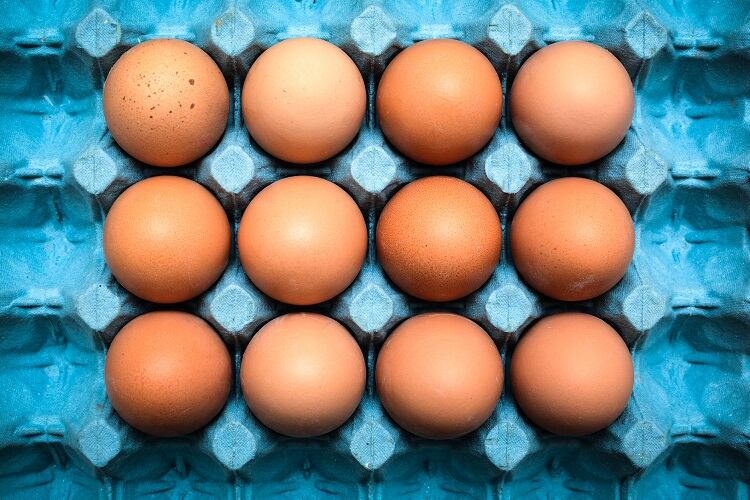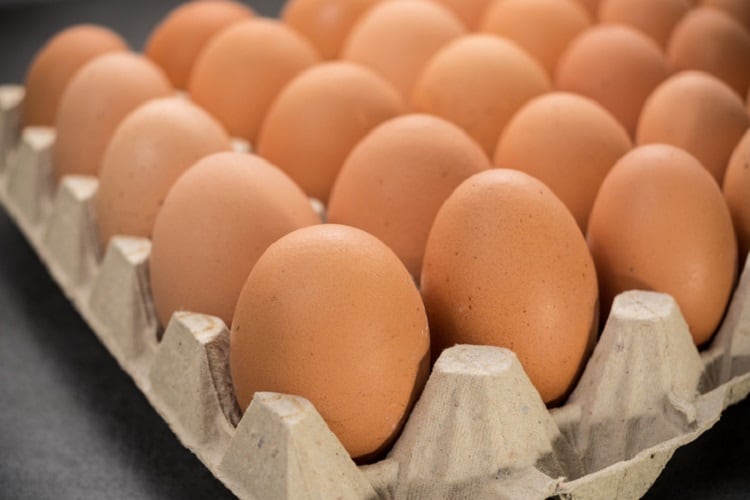The EU prides itself on the strict regulations governing its commercial hen industry. These laws help to protect the environment, ensure food safety, and improve animal welfare standards.
One of the Commission’s most significant rulings in this sector was its 2012 ban on battery-caged eggs. In the EU, egg producers are required to use ‘enriched cages’, which provide each laying hen with at least 750cm² of space.
However, EU regulations have proved financially demanding on many egg producers. Earlier this year, Finnish food company Fazer Group said members of its egg supply chain made significant investments to meet these requirements. “Suppliers made a lot of investments [in their infrastructure]…and are still paying for those investments,” Fazer Group’s sustainability director Nina Eloomaa told FoodNavigator.
So how do these regulations affect the bottom line of egg production? According to a report from the Netherlands’ Wageningen University & Research, EU legislation increases egg production costs by an estimated 16% at farm level.
Report author Peter van Horne says that without import levies to protect against large-scale imports from non-EU countries, this 16% could hinder the competitiveness of Europe's industry.
What’s that got to do with the price of eggs?
These are the findings of Wageningen Economic Research's Competitiveness of the EU egg sector report, created for the EU trade association for egg packers, egg traders and egg processors (EUWEP).
In the report, van Horne investigates the impacts that removing or reducing import levies on shell eggs - also known as table eggs - and egg powder from non-EU countries could have on the industry.

Europe accepts shell eggs and egg powder imports from countries with less stringent regulations, notably the US, Ukraine, Argentina, and India.
In Argentina, India and Ukraine, there is no legislation on animal welfare. In these countries, laying hens are housed in conventional cages with a space allowance of 350 to 400cm² per hen – approximately half the space afforded to laying hens in the EU.
Lower regulation standards mean significantly lower egg production costs, according to van Horne. Compared to the average production cost in the EU – which was calculated in 2017 as 0.88€ per kg of shell eggs, the US was cheaper by 24%, Ukraine by 22%, Argentina by 14%, and India by 11%.
“These countries have lower feed costs, and larger farms [which are] more efficient. But the main reason [for these cost differentials] is the level of legislation and regulation,” van Horne told FoodNavigator.
Looking at production costs alone, EU egg producers “can’t compete with countries like Argentina, the US, and Ukraine”.
Comparing shell egg and egg powder production costs
Wageningen Economic Research’s Peter van Horne found that production costs of shell eggs produced in enriched cages in the EU in 2017 came to an average 0.88€ per kg of eggs.
- In Denmark, the average cost was 0.96€ per kg
- In UK, 0.94€
- In Spain, 0.82€
- In Poland, 0.83€
Compared to the average level within the EU, production costs for shell eggs in 2017 were lower in the US (-24%), Ukraine (-22%), Argentina (-14%) and India (-11%).
For whole egg powder, the non-EU countries were even more competitive.
Compared to the average level within the EU, the production costs of whole egg powder in 2017 were lower in USA (-21%), Ukraine (-20%), Argentina (-13%) and India (-13%).
“Because the cost of transportation in powder is low, the offer price of whole egg powder from third countries is relatively low. Current import levies protect the EU from imports from these countries,” noted van Horne.
Save the levies
Luckily for EU egg producers, import levies and quotas on shell eggs and egg powder from non-EU countries protect against large volumes of imports from third countries. “The difference in production cost is no problem because the EU is protecting the market with these import levies,” van Horne told this publication.
However, increased interest from countries seeking bi-lateral or multi-lateral negotiations could change this. If these negotiations result in a reduction or abolition of import levies, competition from non-EU countries will become a threat, he continued.
The report reveals that in a scenario with 50% lower import levies, Ukraine and the US already offer whole egg powder at a lower price than the EU. Indeed, combined with a 10% lower exchange rate, van Horne said that all non-EU countries have a “considerably lower” offer price on egg powder.
In what van Horne described as a ‘worst-case scenario’ – whereby no import levies are charged and a 10% lower exchange rate is available for non-EU currency – he found that all non-EU countries would be “very cheap” suppliers of whole egg powder to Europe.
“Offer prices could be as low as 18% (Argentina, India), to even 27% (Ukraine) below the average EU level” he writes in the report.
Such agreements would ultimately weaken the position of Europe’s egg industry, van Horne told us. “Europe is more expensive, other countries are very cheap, and at the same time [these agreements] reduce import levies.
“At the same time, [EU] farmers say this is not a level playing field. [They feel they] cannot compete because [of EU] regulation.”
“As consumption eggs have to be fresh, they are not coming from the US. The real threat is egg powder. And this egg powder is going to industry to make sauces, bakery products, or mayonnaise.
“Powder is low in transportation costs and has a storage period of one year, so it is very easy to handle” - Wageningen University researcher Peter van Horne

Given these findings, van Horne urges policymakers to consider the position of specific industries when negotiating trade deals.
“Especially within the egg industry, with the cage ban and [outlawed] meat and bone meal [feed], and all the welfare regulations.
“My message is that policymakers in Brussels be careful with making free trade agreements. Please protect the market…there is need for protection. Levies should be high [with] a very limited quota for low levels of imports.”




